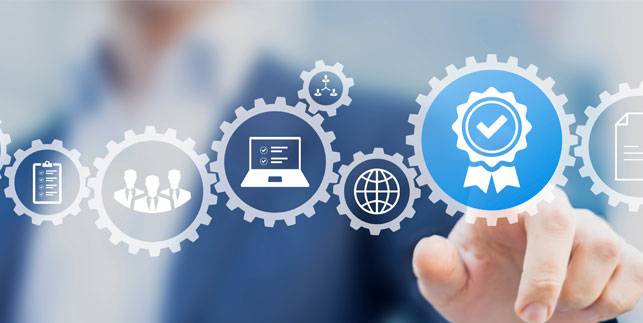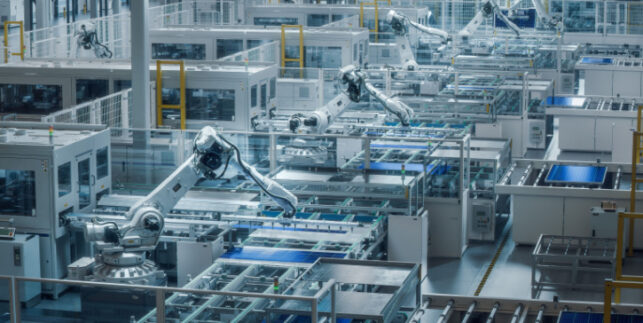New Sustainable Manufacturing Regulations: What Manufacturers Should Know

Regulatory compliance is one of the most significant challenges that manufacturers face. Regulations are always changing, and these changes seem to have taken on a rapid pace over the past few years. Today, manufacturers must continuously audit and adjust their operations to meet new standards.
This is a particularly difficult challenge for manufacturers with multiple sites spread across different countries. Regulations vary between those countries, and they often have an impact on both upstream and downstream supply chains as well. As a result, many manufacturers are looking to implement solutions that provide greater supply chain visibility at the component level.
These are some of the major changes happening around the world today in terms of manufacturing regulation.
The United States of America
The US accounts for 16.8% of global manufacturing output, roughly $2.3 trillion dollars each year. It is also a world leader in sustainable manufacturing, pioneering many methods and technologies. Recent sustainable manufacturing regulation in the US has focused on incentivizing clean manufacturing and investment in smart manufacturing technology.
The Federal Buy Clean Initiative
The Federal Buy Clean Initiative is an initiative implemented in accordance with the 2021 Federal Sustainability Plan. It establishes requirements for federal contracts to only work with organizations that meet certain sustainability guidelines.
The US government is the largest purchaser of services and goods in the world, so meeting those guidelines provides significant opportunities for manufacturers. Failing to meet sustainability standards can prevent access to such contracts, potentially losing out on a significant portion of the market.
Much of the initiatives are focused on robust supply chain accounting. Manufacturers must be able to accurately demonstrate emissions and consumption data regarding their products, including upstream and downstream impacts.
National Strategy for Advanced Manufacturing
The National Strategy for Advanced Manufacturing was announced in October 2022. The strategy is set to serve as policy guidance throughout all levels of governance with a focus on resilience and sustainability in manufacturing supply chains.
Much of the strategy focuses on the implementation of advanced manufacturing solutions to make better use of data in manufacturing environments. Manufacturers can expect to see investment in these areas and an increase in regulatory requirements as these advanced solutions see wider adoption.
The European Union
The European Union provides varying levels of regulation for its 27 member states. Among them are three of the world’s top ten manufacturing countries, Germany, Italy, and France. The European Union currently sets some of the world’s most ambitious sustainable manufacturing goals and enacts a variety of legislations to move toward them.
Regulation on Ecodesign for Sustainable Products
Much of the European Union’s overall sustainable manufacturing regulation is guided by the Circular Economy Action Plan, adopted in 2020. The action plan focuses on the design, manufacture, and life cycle of products to promote sustainability.
Under that action plan, there is a current proposal for a Regulation on Ecodesign for Sustainable Products that will affect manufacturers across many industries when put into place. The regulation will establish requirements for durability, reliability, reusability, recyclability, and energy and resource efficiency in manufacturing certain classes of products.
Many stipulations of the regulation will impact manufacturers. One example is the implementation of “digital product passports” for all products sold within the EU. Manufacturers will have to record and maintain data related to the manufacture and distribution of all products to provide a complete map of traceability, energy, and resource consumption across all supply chains.
EU Corporate Sustainability Reporting Directive
The recently adopted Corporate Sustainability Reporting Directive amends the existing Non-Financial Reporting Directive to increase reporting and accountability regarding sustainability in manufacturing and supply chains.
The directive requires organizations to publish data concerning sustainability and other areas. At present, the directive applies to organizations with a net turnover of €40 million, a balance sheet total of €20 million, or more than 250 employees. Smaller organizations have until 2026 to comply.
Manufacturers must meet the sustainability reporting standards established by the directive. This will mean providing validatable data on energy and material consumption, recycled content use, and emissions.
Germany
Germany is the largest economy in the EU and the 4th largest manufacturer worldwide at 5.3% of global manufacturing output. Alongside the EU regulations that it abides by and plays a central role in establishing, Germany also sets its own internal rules to promote sustainable manufacturing.
Act on Corporate Due Diligence Obligations in Supply Chains
Passed in 2021, the Act on Corporate Due Diligence Obligations in Supply Chains has now come into effect in Germany as of 2023. The act establishes responsibility for social and environmental practices throughout any organization’s entire supply chain.
The act seeks to stop German manufacturers from skirting regulations by proxy through the use of products and materials from regions with little to no enforcement of human rights and environmental regulations.
Manufacturers will have to provide clear raw material accounting for all of their products, clearly showing where all materials come from. Failure to abide by the terms of the act will result in financial penalties.
France
France is the 8th largest manufacturer worldwide at 1.9% of global manufacturing output. The country is often cited as one of the most sustainable in the world, with a long history of forward-thinking policies concerning emissions and waste.
Anti-Waste for a Circular Economy Law
Under the Anti-Waste for a Circular Economy Law, France has established a new environmental labeling regulation. The new rule establishes a variety of product labeling requirements targeting sustainability and recyclability.
Manufacturers that print claims of recycled material content must state a specific minimum percentage. They must also be able to provide the appropriate data to demonstrate those claims. Companies with revenue over €50,000 must comply as of 2023, with smaller companies deferred to 2024 and 2025.
The United Kingdom
Having withdrawn from the European Union, the UK now relies solely on its own regulatory frameworks. It is the 9th largest manufacturer worldwide at 1.8% of global manufacturing output. Its regulations feature some of the most direct measures in dealing with plastic waste and recycling.
Best Available Techniques Framework
The UK government has established a new framework that will regulate industrial emissions and the techniques used to measure those emissions. The Best Available Techniques framework will require industrial facilities to implement the best available methods in minimizing environmental impact.
Implementing those techniques will be a requirement to receive permits from environmental regulators. Permits will carry emissions limits that organizations must ensure they do not exceed. This will require ongoing emissions monitoring and reporting. The new framework is to be administered by a Standards Council that will integrate and work with existing local councils.
The Plastic Packaging Tax
The UK’s new Plastic Packaging Tax came into effect in April 2022. The regulation establishes a new tax for manufacturers and suppliers of plastic packaging based on recycled material content. Any packaging that does not contain at least 30% recycled material will be taxed.
In order to avoid the tax, manufacturers must demonstrate the recycled material content of the plastic packaging they produce. This requires collecting accurate raw material data for specific production lots, which must then be prepared and reported to the government.
China
China is the world’s largest manufacturer at 28.7% of global manufacturing output. It also represents 27% of total greenhouse gas emissions, lagging behind in clean manufacturing compared to other leaders in manufacturing. Despite a reputation for poor sustainable manufacturing practices, China has passed a variety of measures to address this area.
Administrative Measures for the Legal Disclosure of Enterprise Environmental Information
As of February 2022, Chinese manufacturers face increased ESG requirements under the Measures for the Administration of Legal Disclosure of Enterprise Environmental Information. In the past, ESG reporting has been largely voluntary, but this new regulation establishes fines for non-compliance.
The regulation establishes categories of information that organizations must report to demonstrate regulatory compliance. Pollutant generation, environmental management, emissions, ecological emergency, and other data must now be recorded to meet guidelines.
Clean Production Audit Measures
China has introduced audits for various industries to ensure sustainable production, focusing on both energy consumption and pollution. The regulation establishes the need for internal audits in these areas, the results of which must be made publicly available.
Pollutant discharge is one area of focus for these audits. Manufacturers must demonstrate that they are in line with both national and local standards. Manufacturers must also meet guidelines for energy consumption per unit of production to demonstrate energy efficiency. Toxic and harmful materials are also included in the scope of these audits.
Failure to implement these audits or falsification of the audit data will result in an order to resolve the issue within a designated time frame. Past that time frame, organizations will be subject to fines.
Japan
In recent years, Japan has made significant investments in reducing fossil fuel consumption and tackling other areas of sustainability. They are the world’s third-largest manufacturer at 7.5% of global manufacturing output. Many of their policies focus on advanced technologies to support sustainability in new ways.
Act on the Promotion of Recycling of Plastics
The Act on the Promotion of Recycling of Plastics came into effect in April 2022 and sought to reduce plastic waste in the environment, particularly marine plastic pollution. The act establishes a variety of regulations focusing on the design, manufacture, sale, disposal, and recycling of plastic products.
Guidelines for manufacturers included in the act address the design and lifecycle of plastic products. Manufacturers must take measures to use less plastic materials, reduce packaging, and design products for easy collection, separation, and recycling.
The act introduces a certification program that will recognize specific products and manufacturers with the aim of encouraging their success. Manufacturers will have to provide robust data concerning production in order to demonstrate the overall sustainability of their operations to receive certification.
Prepare Your Operation for New Regulations
These are just some of the most recent regulations to come into effect and change the way that manufacturers operate. Regulations will only continue to change into the future, and manufacturers need to ensure that they are ready for them.
Matics Real-time Operational Intelligence (RtOI) is a solution that lets manufacturers achieve agile and data-driven factory floors. Real-time data aggregation and analysis let you meet reporting requirements to establish regulatory compliance in your operations with complete production data.
Work management tools let you make changes on the factory floor as easily as possible, and real-time monitoring lets you know the impact of those changes immediately. When regulations require new process steps or recipes, you’ll have everything you need to make the transition go smoothly.
Matics RtOI features tools for both material and energy consumption management. You can maintain compliance with regulations on both recycled content use and energy efficiency with real-time oversight of KPIs and your production goals.
Matics’s RtOI is an off-the-shelf manufacturing solution that allows for full bidirectional integration between ERP/MRP systems and the manufacturing floor, something that is commonly overlooked within manufacturing facilities.
Our team provides straightforward integration of our solution on any factory floor. You can improve operational efficiency and maintain compliance without upsetting production or significant infrastructure investment. Reach out to Matics today to schedule your demo.




